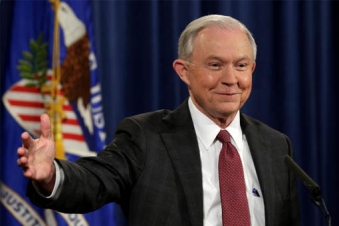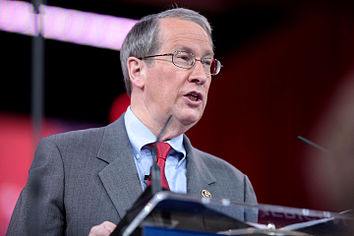burnin1
Well-Known Member
From marijuana.com
The Ending Federal Marijuana Prohibition Act, Explained in Exactly 667 Words

US Attorney General Jefferson Sessions
By Nicolas Juarez on July 19th, 2018
As the number of states legalizing medicinal and recreational cannabis increases, so too does the tension between state and federal laws governing enforcement. One of the dozens of marijuana amendments floating through congress is the Ending Federal Marijuana Prohibition Act, a bill that would amend the United States Code by removing marijuana from the Controlled Substances Act, allowing states to be in full control of their marijuana policy without interference from federal law enforcement.
Now that US Attorney General Jeff Sessions earlier this year revoked the Cole Memorandum, an Obama-era policy that allowed states to implement their own marijuana laws without federal interference, marijuana-related legislation such as the Ending Federal Marijuana Prohibition Act become increasingly important to safeguard cannabis consumers and the emerging legal marijuana industry. Former Deputy Attorney General James Cole, who issued the memo, told Marijuana Moment on July 12, 2018:
“I look at the new (congressional) legislation that’s been proposed, which is, I believe, simple and straightforward. I think Congress is where the activity needs to take place. I think it is moving toward that. There’s growing acceptance of it. I think it’s a matter of ‘when’ and not ‘if’ at this point.
What the bill proposes to do
Introduced to the House by Virginia Republican Rep. Thomas Garrett, the bill is substantial in scope. Garrett’s bill proposes two major changes to the federal government’s cannabis policy:
Who supports the bill
Independent Vermont Sen. Bernie Sanders introduced an identical bill in the Senate in 2015 that died less than a year later with no co-sponsors.
The bill to end prohibition has been able to garner bipartisan support, which in July 2018 quietly gained its 38th cosponsor, Minnesota Democratic-Farmer-Labor Rep. Betty McCollum.
In January 2018, the bill saw a spike of support in the wake of Sessions’ rescission of the Cole memo, including Democratic Reps. Michael Capuano of Massachusetts, and Barbara Lee and Jerry McNerney, both of California.
The status of the bill
Less than a month after its introduction to the House, the Ending Federal Marijuana Prohibition Act was referred to the Subcommittee on Crime, Terrorism, Homeland Security, and Investigations on March 16, 2017; the bill hasn’t moved since.
After gradually gaining co-sponsors over the next few months, the bill failed to get more support for the rest of 2017. When Sessions rescinded the Cole Memo the bill started to gain support again.

Virginia Republican Rep. Bob Goodlatte,
On February 5, 2018, concern over Sessions’ action motivated Democrats in the House Committee on the Judiciary to ask the committee’s chairman, Virginia Republican Rep. Bob Goodlatte, to call a hearing regarding the decision and to “evaluate potential legislation related to marijuana.” No marijuana-related hearing followed. Currently, the judiciary committee has scheduled no hearings or markups to decide the fate of the prohibition bill.
https://www.marijuana.com/news/2018...ohibition-act-explained-in-exactly-667-words/
The Ending Federal Marijuana Prohibition Act, Explained in Exactly 667 Words

US Attorney General Jefferson Sessions
By Nicolas Juarez on July 19th, 2018
As the number of states legalizing medicinal and recreational cannabis increases, so too does the tension between state and federal laws governing enforcement. One of the dozens of marijuana amendments floating through congress is the Ending Federal Marijuana Prohibition Act, a bill that would amend the United States Code by removing marijuana from the Controlled Substances Act, allowing states to be in full control of their marijuana policy without interference from federal law enforcement.
Now that US Attorney General Jeff Sessions earlier this year revoked the Cole Memorandum, an Obama-era policy that allowed states to implement their own marijuana laws without federal interference, marijuana-related legislation such as the Ending Federal Marijuana Prohibition Act become increasingly important to safeguard cannabis consumers and the emerging legal marijuana industry. Former Deputy Attorney General James Cole, who issued the memo, told Marijuana Moment on July 12, 2018:
“I look at the new (congressional) legislation that’s been proposed, which is, I believe, simple and straightforward. I think Congress is where the activity needs to take place. I think it is moving toward that. There’s growing acceptance of it. I think it’s a matter of ‘when’ and not ‘if’ at this point.
What the bill proposes to do
Introduced to the House by Virginia Republican Rep. Thomas Garrett, the bill is substantial in scope. Garrett’s bill proposes two major changes to the federal government’s cannabis policy:
- Remove marijuana and tetrahydrocannabinols from the schedule of controlled substances
- Remove criminal penalties for importing, exporting, manufacturing, distributing or possessing marijuana with the intent to distribute.
- High potential for abuse
- No currently accepted medical treatment use in the U.S.
- No accepted safe use under medical supervision
Who supports the bill
Independent Vermont Sen. Bernie Sanders introduced an identical bill in the Senate in 2015 that died less than a year later with no co-sponsors.
The bill to end prohibition has been able to garner bipartisan support, which in July 2018 quietly gained its 38th cosponsor, Minnesota Democratic-Farmer-Labor Rep. Betty McCollum.
In January 2018, the bill saw a spike of support in the wake of Sessions’ rescission of the Cole memo, including Democratic Reps. Michael Capuano of Massachusetts, and Barbara Lee and Jerry McNerney, both of California.
The status of the bill
Less than a month after its introduction to the House, the Ending Federal Marijuana Prohibition Act was referred to the Subcommittee on Crime, Terrorism, Homeland Security, and Investigations on March 16, 2017; the bill hasn’t moved since.
After gradually gaining co-sponsors over the next few months, the bill failed to get more support for the rest of 2017. When Sessions rescinded the Cole Memo the bill started to gain support again.

Virginia Republican Rep. Bob Goodlatte,
On February 5, 2018, concern over Sessions’ action motivated Democrats in the House Committee on the Judiciary to ask the committee’s chairman, Virginia Republican Rep. Bob Goodlatte, to call a hearing regarding the decision and to “evaluate potential legislation related to marijuana.” No marijuana-related hearing followed. Currently, the judiciary committee has scheduled no hearings or markups to decide the fate of the prohibition bill.
https://www.marijuana.com/news/2018...ohibition-act-explained-in-exactly-667-words/



